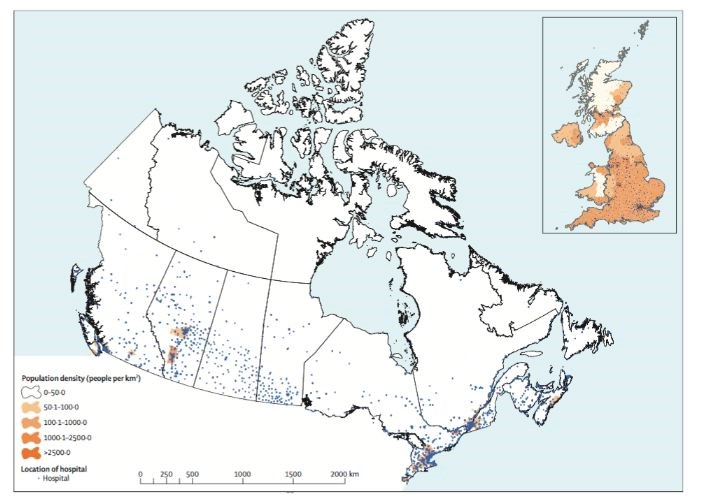A recent feature series in the prestigious Lancet medical journal has drawing attention to some of the shortcomings of the Canadian healthcare system, particularly the inequities in care for indigenous people in northern and remote communities.
Two faculty members at UNBC and one Prince George-based surgeon feature prominently in the Lancet's recent in-depth feature series, which examines the strengths of the Canadian system while also arguing that it is overdue for reform. Several challenges are highlighted, including long wait times, inequitable access to health services such as prescription drugs and health disparities for vulnerable populations such as recent immigrants and indigenous people.
Dr. Nadine Caron, who was the first First Nations woman to become a surgeon in Canada, helped write the centrepiece article of the series. The article, entitled "Canada's universal health-care system: achieving its potential," examined the history of universal healthcare in Canada, as well as its key challenges today. Margo Greenwood and Sarah de Leeuw, two instructors at UNBC co-wrote a commentary, along with Nicole Lindsay, about the health disparities facing indigenous people in Canada.
"When people are asked about what defines Canada, a lot of times, near the top of the list is our universal healthcare system. It's really important to recognize that we have something that is fundamental to who we are as Canadian and that's the vision that healthcare is a human right," Caron told the Citizen.
Both articles stress the need to address high rates of infant mortality, tuberculosis, child and youth injuries, diabetes and exposure to environmental contaminants amongst indigenous people. First Nations men have a projected life expectancy 8-9 years less than Canada's average, while First Nations women have a life expectancy that is 2-4 years less than the average. For Inuit people in the territories, men have a life expectancy 18 years less than the average, while women live 9 years less.
The 2015 Truth and Reconciliation Commission included a series of recommendations for addressing these health disparities. They included better funding for aboriginal healing centres, recognition of the value of aboriginal healing practices, an increase in trained indigenous health practitioners and incorporating a course about the history of Canadian mistreatment of indigenous people within Canadian medical schools.
Caron, who works at the Prince George Regional Hospital, said the inequities addressed by the Truth and Reconciliation Commission are starkly apparent in her day-to-day work.
"I witness that every day. I witness that in the patients I get to meet. I get to hear their stories. I witness that when, as a healthcare provider, I'm trying to gain access and resources for a patient and trying to steer a ship that is so difficult to move its course," Caron said.
The Lancet is one of the oldest and most well-known medical journals in the world. Greenwood, who teaches in the First Nations Studies department at UNBC, said the series provided a rare platform to highlight health disparities faced by indigenous people for a global audience.
"One of the important things in writing this article was that this was a global stage," she said.
"It's not always that indigenous people get the opportunity to speak about the contemporary realities of their lives. I think that's what's really important in this. Are we living this in Canada? Absolutely. People really do feel strongly - and should feel strongly - about the inequities."
The Lancet series highlights the establishment of the First Nations Health Authority in B.C. as a positive step in implementing the TRC recommendations related to healthcare.
The series also argues for better collaboration between federal, provincial and territorial governments in order to reduce wait times.
Further to this, the issue draws attention to Canada's international global health programs and points to the historically low levels of Canadian development aid. Canada currently contributes 0.3 per cent, or $4 billion, of its gross domestic income in development aid.
"The lack of generosity beggars belief for the tenth largest economy in the world and for a country that by its own accounts has the highest economic growth of any G7 country," wrote editors Jocalyn Clark and Richard Horton in an introduction to the series.


